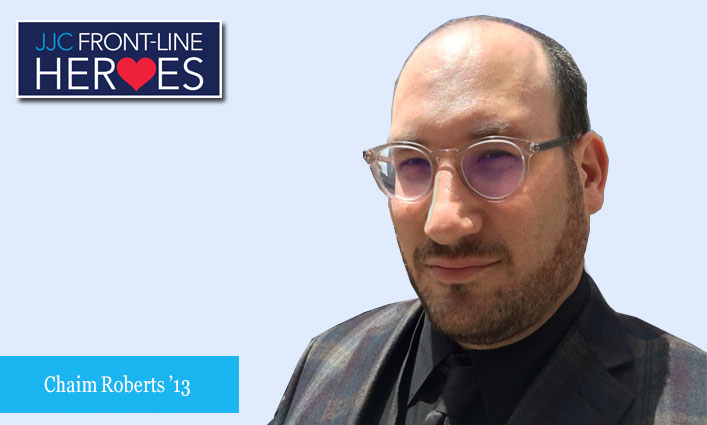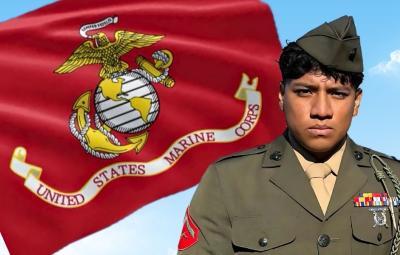
New York City is at the epicenter of the Covid-19 health crisis, and as a New York City-based College that educates students committed to public service, our alumni, students, faculty, and staff are working on the front lines to keep our communities safe. Our “Front-Line Heroes” article series serves as a testament to the valiant efforts of our first responders and essential workers. As a community we thank them for their service, dedication, and personal sacrifice.
Before the Covid-19 health crisis, the World Trade Center was arguably one of the busiest places in the City, seeing millions of visitors and commuters every year. Now, in the midst of the pandemic, it’s up to folks like Chaim Roberts ’13—Supervising Security Coordinator, World Trade Center and Port Authority of New York and New Jersey, and adjunct faculty member in the Department of Security, Fire, and Emergency Management—to keep this landmark and transportation hub safe and running smoothly. “Every course I took in my program at John Jay—from budgeting to emergency management—has assisted my work and decision-making process throughout the response to this crisis,” says Roberts.
“Every course I took in my program at John Jay—from budgeting to emergency management—has assisted my work and decision-making process throughout the response to this crisis.” —Chaim Roberts
On February 26, Roberts saw a news broadcast stating that all continents, except Antarctica, had reported cases of the novel coronavirus. Straightaway his background in emergency management kicked in and he started to calculate the possible ramifications. “During a staff meeting that morning, I asked one of our security contractors about any specific planning they were conducting in consideration of this developing into a pandemic,” says Roberts, whose thoughts immediately went to protecting all the workers and visitors at the World Trade Center Campus. “Coming home, I started thinking about my family and all of their needs. My mind started racing to what my wife and four-year-old son might need. There was a preemptive purchase of extra toilet paper and personal care products.”
“Each time I hear about the death of a coworker—regardless of how close they were to me—I feel a powerful sense of urgency to do what I can to ensure the safety of people traveling through or working at the World Trade Center Campus.” —Chaim Roberts
Now, as he balances the daily responsibilities of a young family with his intense work schedule, Roberts makes sure that essential workers can still travel safely through this vital transportation hub. “Considering the iconic status of the World Trade Center Campus, the daily mission of the World Trade Center Security Department has not changed from a security perspective amid the Covid-19 pandemic,” says Roberts. “Our team still operates with the hypervigilant approach that we always do. There are many dedicated people working tirelessly to keep our City safe during these difficult times, and our team has to be dedicated to continuing that protection for them. Right now, we’re deeply involved in planning for how to restart operations when it’s safe and appropriate to do so.” The driving force behind Roberts’ resolve is finding out someone else has contracted the disease, or sadly passed away. “Each time I hear about the death of a coworker—regardless of how close they were to me—I feel a powerful sense of urgency to do what I can to ensure the safety of people traveling through or working at the World Trade Center Campus.”
“Those selfless acts of compassion are a huge part of this war against Covid-19. They’re a sign of hope that we can collectively defeat this enemy virus.” —Chaim Roberts
When asked if there was anything that helped keep him afloat during this challenging time, Roberts didn’t hesitate to mention his wife’s sense of humor or his son’s smile. He also said that small acts of kindness had the power to lift up his spirits and help him see the unity and humanity woven throughout our shared experience. “My mother, who lives in Pittsburgh, started sewing masks to donate to medical facilities as well as for family and friends,” says Roberts. “Those selfless acts of compassion are a huge part of this war against Covid-19. They’re a sign of hope that we can collectively defeat this enemy virus.”
From his experience and knowledge of emergency management, Roberts feels that planning for high-impact events like Covid-19 need to continue well into the future, long after the crisis is contained. “Ebbing of support can negatively affect the ability to respond, which we have seen during this current crisis,” says Roberts. “We need to be empowered and supplied appropriately to address these threats to humanity in the future.”



